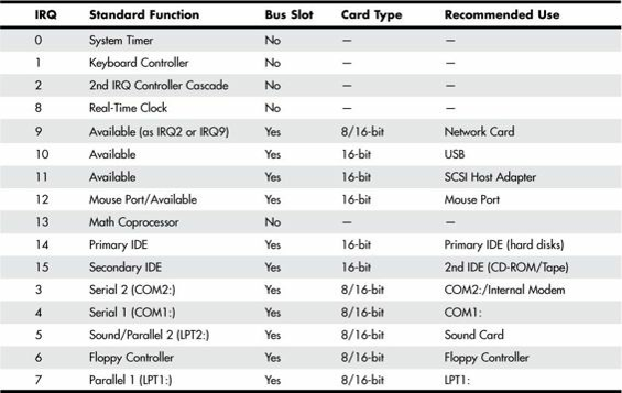Hardware Reference
In-Depth Information
Notice that interrupts 0, 1, 2, 8, and 13 are not on the bus connectors and are not accessible to adapter
cards. Interrupts 8, 10, 11, 12, 13, 14, and 15 are from the second interrupt controller and are
accessible only by boards that use the 16-bit extension connector because this is where these wires
are located. IRQ9 is rewired to the 8-bit slot connector in place of IRQ2, so IRQ9 replaces IRQ2
and, therefore, is available to 8-bit cards, which treat it as though it were IRQ2.
Note
Although the 16-bit ISA bus has twice as many interrupts as systems that have the 8-bit ISA
bus, you still might run out of available interrupts because only 16-bit adapters can use most of
the newly available interrupts. Any 32-bit PCI adapter can be mapped to any ISA IRQs.
The extra IRQ lines in a 16-bit ISA system are of little help unless the adapter boards you plan to use
enable you to configure them for one of the unused IRQs. Some devices are hard-wired so they can
use only a particular IRQ, and some of the early 16-bit ISA adapters weren't designed to use 16-bit
IRQs (9-15). If you have a device that already uses that IRQ, you must resolve the conflict before
installing the second adapter. If neither adapter enables you to reconfigure its IRQ use, chances are
that you can't use the two devices in the same system.
PCI Interrupts
The PCI bus supports IRQs that PCI devices can use to signal to the bus that they need attention. The
four PCI interrupts are called INTA#, INTB#, INTC#, and INTD#. These INTx# interrupts are
level
sensitive
, which means that the electrical signaling enables them to be shared among PCI cards. In
fact, all single-device or single-function PCI chips or cards that use only one interrupt must use
INTA#. This is one of the rules in the PCI specification. If additional devices are within a chip or
onboard a card, the additional devices can use INTB# through INTD#. Because there are few
multifunction PCI chips or boards, practically all the devices on a given PCI bus share INTA#.
For the PCI bus to function in a PC, the PCI interrupts must be mapped to ISA interrupts. Because ISA
interrupts can't be shared, in most cases each PCI card using INTA# on the PCI bus must be mapped
to a different nonshareable ISA interrupt. For example, you could have a system with four PCI slots





